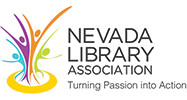Nevada Library Association Handbook
Board of Trustees
Appointed Officers & Standing Committees
Intellectual Freedom
HISTORY
Intellectual freedom, the right to read, and freedom of the press figured prominently in the 1962 annual meeting in Reno, and the "Committee for Intellectual Freedom" was formed that year. The Committee's and NLA's first of many Nevada legislative battles came shortly afterwards, during the 1969 Nevada legislative session. The state "harmful to minors act," dealing with showing obscenity to minors (AB70), passed despite the committee's opposition under the leadership of Thomasine Kleffen. (See NRS 201.265.) The committee's actions to defeat AB70 had the support of Hank Greenspan, editor of the Las Vegas Sun, who editorialized on the bill that "if something is to be banned, someone must ban it." As a follow-up, the 1969 annual meeting centered around the theme, The Challenges of Intellectual Freedom. The first record (in the NLA archives) of an association policy or statement on intellectual freedom comes from the Aug. 1, 1970 issue of Nevada Libraries.
The Intellectual Freedom Committee worked very hard during the 1970's and early 1980's on various fronts. Legislative battles were fought to improve Nevada intellectual freedom legislation, various policies were drafted and adopted by NLA supporting intellectual freedom in Nevada libraries, while education and training materials were developed for those on the "front lines." In 1975, the committee worked to defeat AB722, and then supported more positive legislation in 1977 (ACR 6), which called for an interim study of obscenity legislation. The committee actively participated in the work of the legislative study committee and in the drafting of proposed legislation that met the guidelines set by NLA. In 1977, the resulting legislation (AB143) passed, which provided a school/library exemption to the harmful to minors statute (NRS 201.237), the requirement of prior civil proceedings, incorporated the obscenity-test language of Miller v. California (NRS 201.243) and provides that the community standard be that of the area from which the jury is drawn (NRS 201.235). The April 1978 issue of High Roller was on censorship, with Martha Gould guest editor.
During the period of 1975-79, the committee drafted, published and distributed a Form for Reconsideration of Questioned Materials, the NLA policy on intellectual freedom was revised, and sponsored booths and presentations at the NLA conventions and the Nevada State Fairs. In 1979, AB630, an open public records bill, was defeated, and in 1981, the committee and others were successful in getting SB25 passed (NRS 239.013). That important bill exempts library circulation and use records from the open records laws of the state, and makes it a misdemeanor for librarians to tell others what books a patron has checked out.
In 1984 and 1994 the Intellectual Freedom Committee published the Intellectual Freedom Handbook as a guide for Nevada's libraries and their staff. NLA's and ALA's policies and statements on censorship and intellectual freedom are printed there. Resolution on Access to Library Materials and Services was proposed by the committee and adopted by NLA at the October 1994 conference in response to various book challenges and censorship attempts at the local level in both northern and southern Nevada.
The term of office of the intellectual freedom chairperson has varied over the years and is currently a two-year position appointed in even numbered years (to alternate with the government relations chair, appointed for two-years in odd numbered years).
OFFICERS
- 1962-1963, David Brunton, Nevada State Library
- 1963-1966, Herbert K. Ahn
- 1966-1967, vacant
- 1968-1969, Thomasine Kleffen, North Las Vegas Public Library
- 1970-1971, Jack Gardner
- 1971-1973, Americo Chiarito, University of Nevada, Reno
- 1974, Charles Manley, Washoe County Library
- 1975, Pauline Hayes, Elko County Library
- 1976-1979, Martha Gould, Washoe County Library
- 1979-1981, Nancy Cummings, Clark County Library District
- 1982-1983, Lamont Downs, Clark County Library District
- 1984-1986, Lynn Ossolinski, Incline High School
- 1987-1990, Jim McPhee, University of Nevada, Las Vegas
- 1991-1992, Merilyn Grosshans, Las Vegas High School
- 1993, vacant
- 1994-1995, Suzy Sepahpour, Eagle Valley Junior High, Carson City
- 1996-1999, Lynn Ossolinski, Incline High School
- 2000-2014, Eva Stowers, University of Nevada, Las Vegas
- 2015-2019, Katherine Rankin, University of Nevada, Las Vegas
- 2020, Carrie Stewart, University of Nevada, Las Vegas
PURPOSE AND DUTIES
The committee works to create an atmosphere of intellectual freedom in Nevada. It is responsible for carrying out the basic policies of intellectual freedom embodied in the U.S. Constitution, the American Library Association's Library Bill of Rights, the Freedom to Read Statement, and other pertinent documents.
DUTIES AND RESPONSIBILITIES
1. The chairperson interprets instructions of the board of trustees to the committee.
2. The chairperson submits copy for association publications concerning information relative to the committee's work.
3. The chairperson will be prepared to address the membership at annual meetings.
4. The chairperson shall supervise the work of the committee in fulfilling its responsibilities to NLA.
5. During a legislative session the chairperson of the Intellectual Freedom Committee and the chairperson of the Government Relations Committee will cooperate closely in all legislative matters affecting the association and libraries.
6. The committee shall keep itself informed on intellectual freedom activities and issues. It should work closely with the ALA's Intellectual Freedom Committee and Office of Intellectual Freedom, the Freedom to Read Foundation, other organizations, etc., and its members should read the Newsletter on Intellectual Freedom and other pertinent documents regularly. It should also follow state activities as reported in newspapers and other communications media, and to attempt to determine the true state of affairs with respect to each issue.
7. The committee will contact Nevada librarians and keep them informed of important issues by publishing articles in Nevada Libraries and/or by publishing a newsletter.
8. The committee shall support anyone, by public statement or other practical means, who requires assistance in promoting intellectual freedom or in fighting censorship. Decisions as to when or how to perform intellectual freedom or in fighting censorship. Decisions as to when or how to perform such support will be reached by agreement of at least three-fifths of the committee membership; when such an agreement cannot be reached, the chairperson may request instructions from the Board of Trustees. Members should be prepared to speak on intellectual freedom issues.
9. The committee shall work against any existing or proposed legislation which would limit intellectual freedom in library services; it should coordinate such activities with the government relations committee, and may request the assistance of that committee and of other NLA members.
10. The committee will keep the Intellectual Freedom Handbook up-to-date and request funds of NLA to see to its publishing and distribution as necessary. This Handbook contains the forms, etc. adopted by NLA.
Policies
Current official NLA policies regarding intellectual freedom are printed in the Nevada Intellectual Freedom Handbook and in this Handbook. They included:
1. Intellectual Freedom in Libraries: A Statement of Policy (adopted 1976)
2. Intellectual Freedom Policy Recommendations (adopted 1976)
3. Intellectual Freedom Policy Resolution (adopted 1976)
4. Resolution on Access to Library Materials and Services (adopted 1994)
INTELLECTUAL FREEDOM IN LIBRARIES
A Statement of Policy
Nevada Library Association
The Nevada Library Association is directly concerned with the freedom and right to privacy of all members of a democratic society to use what materials they will in the course of making the social, educational, and political judgments on which that society is based. We are further agreed that the right to privacy of library patrons is of utmost importance. Without such freedom, the very fabric of democracy is in danger. It is a professional obligation of librarians to give highest priority to the freedom of inquiry and to observe the charges in the Library Bill of Rights and the American Library Association Freedom to Read statement with the utmost integrity.
The Association, as a matter of principle, opposes any legislation at the state, local, and school district leaves which might place library collections in jeopardy, restrict, prejudice, or interfere with free and unbiased selection and acquisition of library materials, or which might otherwise restrict the basic concept of the freedom of use or inquiry.
The Association, as a matter of principle and policy, opposes any proposed or actual restrictions imposed on whatever parties or individuals upon the selection, acquisition, maintenance, administration and dissemination of library materials, and with similar restrictions on cultural activities or educational programs in libraries and other institutions.
The Association is concerned with affecting liaison between itself and other organizations which support the Freedom to Read.
The Association is concerned with school librarians and the general public to the philosophy inherent in the Library Bill of Rights and the American Library Association Freedom to Read statement.
The Association supports the concept of the library user's right to privacy, and maintains, as a vital principle, that official or unofficial surveillance, without due process, of library circulation records represents a violation of intellectual freedom and the traditional right of free inquiry.
Adopted 1976
INTELLECTUAL FREEDOM POLICY RECOMMENDATIONS
Nevada Library Association
The freedom to communicate is a necessary function of a democracy and no institution makes this freedom more meaningful than the library. The library has the responsibility for providing the widest possible range of views and expressions and must, therefore, resist any attempts to restrict this responsibility.
To fulfill this responsibility, libraries must institute policies to implement it, and thus the Nevada Library Association recommends to members and all library bodies that they:
I.Adopt the ALA Bill of Rights, the School Library Bill of Rights, and the Freedom to Read statements as official basic policies for insuring freedom of access to information and libraries.
II.Formulate and use explicit, written criteria for selecting library materials.
III.Establish a clearly defined procedure for handling complaints, specifying what authority will make the final decision, i.e., Librarian, Library Board or a duly constituted committee appointed by the governing body.
IV.Authorize the Intellectual Freedom Committee to examine and make recommendations on existing and proposed legislation at all political levels, so such legislators will recognize the responsibilities of the library as a media of communication.
V.Obtain all complaints in writing and forward copies to the Chairman of the Intellectual Freedom Committee and keep the committee apprised of all developments relating to any complaints.
VI.Inform the Intellectual Freedom Committee of any attempts, successful or not, by individuals or groups, or administrative authority to restrict the selection or acquisition of materials in libraries or administrative practices of librarians.
Adopted 1976
INTELLECTUAL FREEDOM POLICY RESOLUTION
Nevada Library Association'
Whereas, the Freedom to communicate is a necessary function of a democracy, and no institution makes this freedom more meaningful than the library, and
Whereas, the Library has the responsibility for providing the widest possible and must, therefore, resist any attempts to restrict this responsibility,
Therefore: be it resolved that the Nevada Library Association reaffirms, as a matter of principle, its adoption of the American Library Association Bill of Rights, the School Library Bill of Rights and the Freedom to Read statements as official policies for assuring freedom of access to information for and in libraries.
Adopted 1976
RESOLUTION ON ACCESS TO LIBRARY MATERIALS AND SERVICES
Nevada Library Association
WHEREAS, Libraries have the important mission of protecting the right of free speech by making the widest diversity of views and modes of expression available to everyone.
WHEREAS, Libraries should provide materials and information presenting all points of view on current and historical issues, and should not proscribe or remove materials because of personal, partisan or doctrinal disapproval.
WHEREAS, Libraries should provide the best information and materials on various subjects and literature in response to what is in demand, and to make them freely available so that people may make their own choices.
WHEREAS, Libraries enable citizens to make intelligent decisions based on information on all sides of a question - including minority, as well as popular points of view.
WHEREAS, Libraries serve the entire community, with all its social, political, economic, religious and cultural diversities and alternative lifestyles.
WHEREAS, Libraries provide books and other materials, programs, and services for the interest and enlightenment of people of all ages.
WHEREAS, Libraries should not restrict access to library resources to avoid objections from parents or pressure groups.
WHEREAS, Parents, and only parents, have the right and the responsibility to restrict access of their children, and no others, to library resources.
RESOLVED, That the Nevada Library Association defends citizens' rights to free access to library collections and services and opposes all attempts by pressure groups or individuals to limit access to the full range of library materials, programs or services.
RESOLVED, That the Nevada Library Association defends intellectual freedom and opposes censorship or discrimination against any group or segment of society.
Adopted 1994




